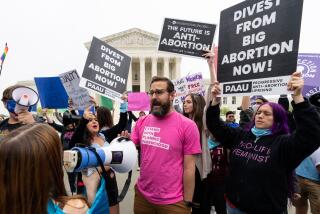Court Upholds Disability Screening Rules
- Share via
WASHINGTON — The Supreme Court Monday upheld the framework of a controversial Reagan Administration policy that has made it harder for people to qualify for disability benefits from the Social Security Administration.
However, the court, in a narrow ruling that reflected significant divisions of opinion, did not decide whether the Administration has been applying the policy properly.
The result, legal officials said, is that further court action will be necessary to determine whether the Administration may continue to use the strict policy to deny benefits to people who previously would have qualified for them.
‘Hollow Victory’
Eileen Sweeney, a lawyer for the National Senior Citizens Law Center, called the ruling a “hollow victory for the government.”
Even though the Administration’s screening regulations were upheld, “the whole issue goes back to the lower courts. I think the (Supreme) Court will eventually get this back again for a final resolution,” said Sweeney, who represents a Seattle woman who filed the case in question.
John Trollinger, a spokesman for the Social Security Administration, played down the decision, saying that it “reaffirmed a long-standing evaluation process. The bottom line is that we will not deny benefits to people who are disabled.”
The case stemmed from an attempt by the government to slow the growth of Social Security disability benefits, for which 2 million people apply each year. The law provides for such benefits for people with severe physical or mental impairments who are not able to work.
In 1985, the Administration introduced a five-step screening procedure for applicants and required each applicant to satisfy each step before moving on to the next. Subsequently, some applicants were rejected automatically after failing to convince the agency that they had a “severe” impairment--Step 2 in the procedure. They were not permitted to make their case on the subsequent screening steps that addressed whether they were able to work.
Previously, the agency had assessed in one step whether an applicant had a condition that made him unable to work. The result of the change, critics have charged, is that the agency has concentrated too much on the specific nature of the ailment and not enough on its career effects for the victim.
Lawyers for disabled persons say that 40% of applicants are screened out under the new regulations for failing to prove a severe ailment, up from 8% under earlier rules. This amounts to about 800,000 persons a year.
In its 6-3 ruling (Bowen vs. Yuckert, 85-1409), the court upheld the framework of the screening procedure. “In our view, both the language of the (Social Security) Act and its legislative history support the (health and human services) secretary’s decision to require disability claimants to make a threshold showing that their ‘medically determinable’ impairments are severe enough to satisfy the regulatory standards,” Justice Lewis F. Powell Jr. wrote for the court.
The screening method “increases the efficiency and reliability of the evaluation process by identifying at an early stage those claimants whose medical impairments are so slight that it is unlikely they would be found to be disabled even if their age, education and experience were taken in account,” he added.
However, two of the judges in the majority said that they would not tolerate a government policy that resulted in denial of aid to persons who cannot hold a job, even if their medical condition does not seem severe. That could conflict with the way in which the procedure has been implemented.
The government should not “deny benefits to a claimant (whose) impairment prevents him from engaging in either his prior work or substantial gainful employment,” Justices Sandra Day O’Connor and John Paul Stevens said in a statement that they issued with the majority opinion.
The high court told lower courts to take another look at the case of Janet Yuckert, a travel agent in Seattle who said she had an inner ear ailment that caused frequent dizziness and left her unable to work. A Social Security administrative judge had ruled that her ailment was not “severe” and denied her claim. She filed suit, and a federal appeals court ruled in her favor, declaring the entire five-step screening procedure invalid. The Justice Department took the case to the Supreme Court.
In dissenting from the high court’s decision Monday, Justices Harry A. Blackmun, William J. Brennan Jr. and Thurgood Marshall said that the screening regulations should be invalidated because they allow the government to unfairly deny aid to eligible recipients.
In another action, the court agreed to decide whether the CIA may fire an agent who admits he is homosexual. Last year, a federal appeals court in Washington said that the agency must defend in court its decision in 1982 to dismiss an agent after he told his superior he was gay. Lawyers for the CIA appealed the ruling (Webster vs. Doe, 86-1294).
More to Read
Sign up for Essential California
The most important California stories and recommendations in your inbox every morning.
You may occasionally receive promotional content from the Los Angeles Times.











